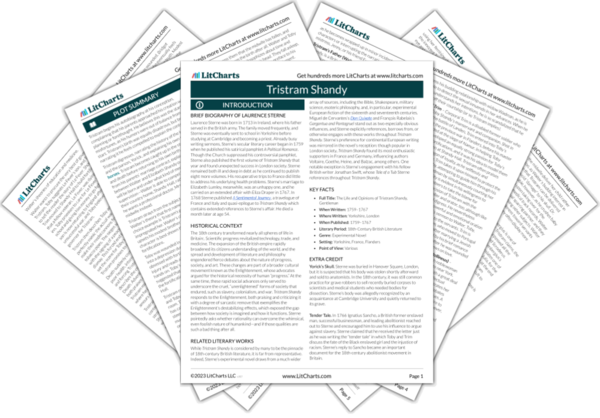In Tristram Shandy, the concept of the hobby-horse (a personal hobby) symbolizes the idiosyncrasies of human nature—and the idiosyncratic nature of humans, both of which are central focuses of the novel. When Tristram first introduces the concept, he makes it clear that he believes the hobby-horse is an essential part of human nature. For this reason, society should encourage and facilitate people’s hobby-horses, no matter how strange a particular hobby-horse may seem to others. People need their hobby-horses, Tristram argues, and a careful observer of humankind—like an author—needs them too, as nothing illuminates the subtleties of a person’s mind as clearly as their hobby-horse.
The book’s featured hobby-horse is Toby’s obsession with fortifications. Toby initially comes to this interest to make sense of his career-ending wound to the groin, but it soon becomes the primary object of his life. As such, Toby and his manservant Trim read all the literature on fortifications they can get their hands on, closely following the latest news of sieges and urban battles on the continent, and even modeling these sieges on the bowling green behind Toby’s house. Bizarre as this may be, it gives Toby’s life meaning. Even Walter, who finds his brother’s hobby-horse extremely aggravating, is forced to concede this point, especially during Toby’s speech in which he eloquently defends the moral value of his hobby-horse. And Walter, of course, would be quite the hypocrite to deny anyone else their hobby-horse: his own unorthodox interests encompass everything from names to noses to the science of childbirth. Tristram, despite his “hobby-horsical” interest in hobby-horses, coyly avoids explicitly telling the reader what his own hobby-horse is, instead preferring to describe those of his family. In doing so, however, he suggests that perhaps his true hobby-horse is his book itself.
The Hobby-Horse Quotes in Tristram Shandy
A man and his Hobby-Horse, tho’ I cannot say that they act and re-act exactly after the same manner in which the soul and body do upon each other: Yet doubtless there is a communication between them of some kind, and my opinion rather is, that there is something in it more of the manner of electrified bodies,--and that by means of the heated parts of the rider, which come immediately into contact with the back of the Hobby-Horse.—By long journies and much friction, it so happens that the body of the rider is at length fill’d as full of Hobby-Horsical matter as it can hold;----so that if you are able to give but a clear description of the nature of the one, you may form a pretty exact notion of the genius and character of the other.
Amongst the many ill consequences of the treaty of Utrecht, it was within a point of giving my uncle Toby a surfeit of sieges; and though he recovered his appetite afterwards, yet Calais itself left not a deeper scar in Mary’s heart, than Utrecht upon my uncle Toby’s. To the end of his life he never could her Utrecht mentioned upon any account whatsoever,—or so much as read an article of news extracted out of the Utrecht Gazette, without fetching a sign as if his heart would break in twain.












